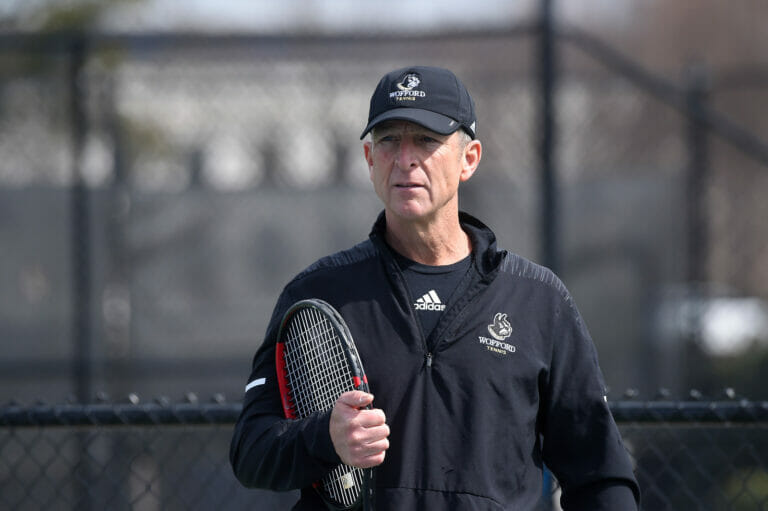
By Sheryl McAlister, USTA SC Senior Director of Community Development
Rod Ray is the eternal optimist. He believes in the good stuff.
He also believes in hard work, life lessons and the value of tennis.
A veteran of tennis in South Carolina as a club pro and college coach, Ray has been at Wofford College for more than 20 years and took over the struggling program in its 3rd year as a Division I college. A small fish in a huge pond. “We’re the underdog, every day,” Ray said. It is a role he seems to relish.
Wofford is one of the smallest D1 schools in the country, a category based on the number of football scholarships. His teams compete in the Southern Conference and his players are routinely honored for both athletic and academic achievements. One of his former players is on the professional tour. “Nobody recruited him out of high school,” Ray said of Rob Galloway. “He came to Wofford because he wanted to be a doctor.”
Talking with Ray is a lot like watching a great tennis match. He moves back and forth between topics about life and values and the importance of college tennis. His pride in his players’ athletic accomplishments is outranked only by his pride in their academic accomplishments and success after college. Going to class is required. And not only do his players graduate in four years, “they are 100 percent successful, compassionate, hardworking people making a difference in society.”
To that end, Ray’s 2008-09 team was the only men’s team in the Southern Conference recognized by the NCAA for academic excellence, an achievement repeated three additional times. In addition, the team was also recognized by the NCAA for outstanding sportsmanship.
His 2009 team won a national award by the NCAA ITA Ethics and Infractions Committee for exemplifying outstanding sportsmanship, character, and ethical conduct in the true spirit of competition.
His philosophies about life and tennis seem to go hand in hand. And it is not difficult to understand his level of commitment to people and the sport. His special brand of magic and humanity should be requisite for all college sports.
Make no mistake; he wants to win. But his language isn’t peppered with cliches and platitudes. I got a real sense that what you see is what you get. A fundamentally decent human being, who has a passion for tennis and genuinely cares for his players.
He is a huge fan of grass roots tennis and thinks we need more people involved. And he believes that kids who play college tennis need to give back. He is a staunch supporter of recruiting in his own state as well as internationally, creating a team of players bound by a common interest instead of geography.
Ray is as moved by the struggle of a hard-fought contest as he is by winning a championship. By his telling, maybe more. “The players become brothers at a deeper level,” he said of his college men’s team. “When we have lost a final match, I am often moved to tears. It’s kind of embarrassing, I guess. But the effort was worth so much.”
Studies have long shown that if a kid quits playing a sport as a teenager, the kid will likely not go back to play that sport as an adult. That’s why Ray pulls them in as soon as he can, and he holds on to them as long as they’ll play. As part of Ray’s physical education classes, Wofford gave every participant a racquet. “We hope they stay with it after COVID,” he said. “Courts are packed, and people are playing tennis.”
He believes that COVID has been a wake-up call, particularly since some schools are dropping tennis programs. He also feels strongly that we need to take care of our tennis facilities and re-do them every 20 years.
Ray considers tennis to be a humbling experience. And he wants to continue to help build new courts and create new opportunities – from public facilities to country clubs to high schools and colleges. “We want everybody,” he said. “There is a human piece to teaching tennis and lifelong learning. And we are richer because of that.”
At a time when the looming questions everywhere include whether college kids can play at all or whether a program will survive, he remains steadfast in his belief that we need college tennis. “At the end of the tough times is where the good stuff is,” he said. “Tennis … makes us better people.”
###

